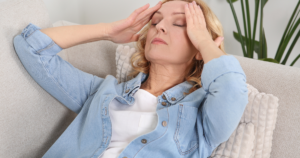Everyone deals with stress, anxiety, and depression at some point in their lives. The Bay Area is no different. In fact, the pressures of living in this high-demand region may produce stronger reactions than usual. An analysis by the New York Times found that the San Francisco metro area has the highest rate of chronic anxiety in the country. While the reasons for this trend are not clear, there may be a link to stressors such as housing costs, long commutes, and difficulty finding one’s place in the world after college. In response to these findings, organizations have sprung up across the Bay Area to offer support services for people dealing with anxiety and depression. These resources also help those who want to find new ways of managing their stress and general outlook on life.
What is Stress?
Stress is a feeling of pressure caused by the demands placed on you. It is a normal part of life. However, too much stress can have negative effects on your health and quality of life. Stress can be caused by many factors — both internal and external. Internal factors include personality, genetics, and how you respond to new situations. External factors include your environment and lifestyle. You can reduce stress by managing your time, setting realistic goals, staying positive, and finding support. Stress can cause physical and emotional symptoms. Physical symptoms include headaches, muscle tension, back pain, and fatigue. Emotional symptoms include feeling anxious, sad, upset, or irritable. Too much stress can affect your health and quality of life. It can increase your risk of anxiety, depression, and other mental illnesses. It can also lead to missed work days and a lower quality of life.
Signs of Anxiety
There are many signs of anxiety, including excessive worrying, difficulty relaxing, and feeling easily overwhelmed. If you are experiencing any of these signs, it may be a sign that you are experiencing anxiety. Anxiety is an emotion that occurs when a person feels threatened by something. Anxiety can be both helpful and unhelpful. Helpful anxiety can help you prepare for a big exam or job interview. Unhelpful anxiety can cause you to worry needlessly or experience mild panic attacks. If you are experiencing excessive or unhelpful anxiety, there are many ways to manage the symptoms and live a healthy, happy life. Some people find relief in seeing a therapist, while others benefit from mindfulness meditation.
Depression Symptoms
According to the National Alliance on Mental Health, there are many signs that you may be experiencing depression. It is important to keep in mind that not everyone experiencing these signs will be diagnosed with depression. It is important to note that these symptoms can apply to those experiencing anxiety as well. A diagnosis of depression is never made based on symptoms alone. It is important to be open and honest with a doctor about how you are feeling so that you can be properly diagnosed and treated. Symptoms of depression include feelings of sadness, hopelessness, anger, and loss of interest in things you used to enjoy. Some people also experience changes in appetite, sleeping patterns, and energy levels. Depression is not a sign of weakness and can be treated. There are many effective methods, such as therapy and medication.
Coping Strategies to Deal with Stress and Depression in the Bay Area
Find a support group. Whether you are facing anxiety, depression, or another mental health issue, support groups can help you feel less alone and speak with others who are experiencing similar challenges. Spend time outside. Studies have found that spending time in nature can reduce feelings of depression and anxiety. Make time for self-care. Anxiety and depression can make it hard to do basic self-care, like eating well, sleeping well, and taking care of your hygiene. Ask for help. Mental health issues can be challenging to navigate on your own. If you are experiencing challenges, reach out to friends or family members. If you don’t feel comfortable sharing your struggles, find a therapist or mental health professional near you.
Intensive Outpatient Programs (IOP) for Anxiety and Depression
An intensive outpatient program (IOP) is a type of mental health program that allows those struggling with anxiety or depression to continue with their daily lives while receiving treatment. IOPs are flexible and often allow patients to attend treatment while working. IOPs are not meant to be a long-term solution to mental health issues, but rather a tool that helps those with anxiety and depression get and stay on the path to recovery. In some cases, IOPs are covered by insurance. IOPs follow a schedule similar to a 9-5 job. Patients are expected to arrive on time, participate in group discussions, and complete any homework assigned. IOPs also include clinical sessions, which are often one-on-one with a therapist. These sessions are where a person goes over the issues that brought them to the IOP in the first place and works through strategies for remaining healthy and happy. IOPs are a great option for those who need help with anxiety or depression but can’t afford long-term treatment.
Ketamine for Depression and Anxiety
Ketamine is being used as a treatment for depression and anxiety. One study found that ketamine worked as well as an antidepressant in patients with treatment-resistant depression. This means that the drug was as effective as antidepressant therapy at reducing symptoms of depression and anxiety if combined with psychotherapy. Ketamine can also start working in almost one session. Remember that antidepressants typically take up to three weeks to start working. If you are experiencing treatment-resistant depression, ketamine may be an option for you. But be aware that the effects of ketamine are short-term and do not last as long as antidepressant therapy does so you must add psychotherapy to it.
Other Ways to Help Yourself
There are many ways to help yourself if you are experiencing anxiety or depression. These include: Practicing mindfulness and meditation. These activities help you manage stress and feel happier. Eliminating toxic people from your life. Friends and family can be great sources of support and help you feel better. But sometimes toxic people can drag you down and make your feelings of depression and anxiety worse. Spending time in nature, doing yoga, or meditating. These activities can all help you feel calmer and happier.
Conclusion
Anxiety and depression are real issues that affect many people in the Bay Area. There are many ways to help yourself if you feel like you are experiencing these issues. If you feel like you are struggling, don’t be afraid to reach out for help. It is important to remember that you are not alone and there are many people who want to support you.
__
Clear Mind Treatment is a 45-90 day program specialized in treatment resistant depression, anxiety, bipolar disorder, and PTSD using traditional psychotherapy and cutting edge technologies, like Ketamine, TMS, EMDR. We are a big fan of neuroplasticity and meditation and believe that when you can change your thought and feeling patterns, you can change your life. We work with people all over the State of California remotely and in Arizona. We take most PPO insurance, medicare, and AHCCES in Arizona. Give us a call anytime 310-571-5957 www.clearmindtreatment.com







